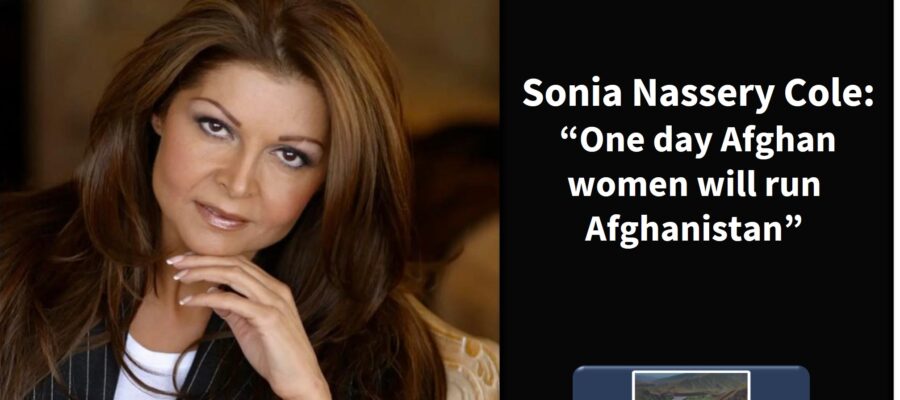Sonia Nassery Cole’s remarkable journey from a young refugee to a passionate activist and filmmaker is a testament to the power of dedication and resilience. As a young teenager, Sonia Nassery Cole found herself in a unique position when then-President Reagan called upon her for help in passing the Stinger Missile Bill through Congress after reading the impassioned nine-page letter she wrote to him, urging him to do something for Afghanistan. This pivotal moment marked the beginning of Nassery Cole’s active involvement in shaping the political landscape of her war-torn homeland. President Reagan’s response was not just a mere acknowledgment;
it was an invitation for Nassery Cole to meet him at the White House and then advocate for Afghanistan in a way that he could not. He believed in her ability to help change the course of history and free Afghanistan from the clutches of the Russian invasion, telling her, “One person can change the world.”
Sonia Nassery Cole later founded the Afghanistan World Foundation in 2002. Driven by a continued desire to advocate for Afghan refugees and address the issues plaguing her homeland, the foundation became a crucial platform for her advocacy.
Facing resistance from her family and losing her marriage did not deter Nassery Cole’s commitment to Afghanistan. She ventured back to her homeland to create the film “The Black Tulip,” which became Afghanistan’s Oscar submission in 2010. This endeavor exemplified her resilience and determination to pursue her passions, even when faced with personal sacrifices.
In a recent video interview with Kauser TV, Nassery Cole recounts the emotional toll she experienced during the Taliban’s takeover of Afghanistan in 2021. Having sacrificed everything for Afghanistan’s future since the 1980s, she found herself in a nightmare as the U.S. withdrew from Afghanistan, allowing the Taliban to seize control of the country. She considers this one of the most shameful moments in U.S. history. Her desperate calls to various branches of the United States Government went unanswered, leading her to express her frustration at the perceived indifference toward Afghanistan.
Nassery Cole reflects on her encounter with Ahmad Shah Massoud in France, where he expressed gratitude for her role in driving the Russians out of Afghanistan. He bestowed on her the title of “Lioness of Panjshir” by Massoud, a testament to her powerful impact. In response to a hypothetical question about Massoud’s potential impact on preventing the Taliban’s resurgence, Nassery Cole firmly believes that he would never have allowed a second takeover.
Expressing her disillusionment, Nassery Cole asserts that Democrats are indifferent to global issues, particularly the plight of Afghanistan. She criticizes President Biden for sending substantial funds to the Taliban without adequate scrutiny. In a plea echoing her actions from decades ago, she calls on United States politicians and Hollywood celebrities to intervene and do something for the next generation in Afghanistan.
Fast forward to the present day, when Afghanistan stands at a crucial crossroads. The withdrawal of U.S. troops in 2021 has left a void that needs to be filled with responsible and strategic engagement. Sonia Nassery Cole’s lifetime of experience leads her to the conclusion that the best path forward can be found in the past.
As Afghanistan grapples with a renewed wave of restrictions on women’s rights, Sonia Nassery Cole, a woman who once played a role in supporting the Mujahedeen during the 1980s, asks a compelling question: “Do the leaders of the Taliban have mothers and sisters, and do they pay respect to their family females?” She now stands perplexed at the Taliban’s repressive measures against women. She recalls her youthful plea to the U.S. government in the 1980s, urging them to support Afghanistan.
She questions why the women who once contributed to the cause of Afghan independence from the Soviet Union are now being banned from society and deprived of educational rights. This sincere appeal delves into the paradoxical nature of the current situation, where those who once benefited from women’s support are now instrumental in suppressing their rights.
Nassery Cole emphasizes the irony of history, recalling her efforts as a teenager to garner U.S. support, including the approval of Stinger missiles to aid the Mujahedeen in the fight against Soviet forces. Little did she anticipate that the son of Sarajuden Haqqani, one of the leaders she assisted, would rise to power in Afghanistan and contribute to the erosion of women’s rights.
In a world fraught with conflict and complexity, individuals like Nassery Cole emerge as beacons of hope, dedicating their lives to making a difference. As a passionate advocate for Afghan women’s rights, she has taken on the monumental task of shedding light on the real struggles faced by women in Afghanistan. Her commitment to bringing about positive change has led her to embark on a daring mission to create a documentary that unveils the authentic face of Afghanistan, challenging preconceived notions and exposing the harsh realities on the ground.
Nassery Cole began this interview with a bold proclamation: “I will do anything for Afghan women.” This declaration underscores her unwavering determination to be a voice for those who often go unheard. Her documentary aims to transcend stereotypes and showcase the resilience, strength, and power that Afghan women possess despite facing numerous challenges.
“I am ready to serve my country,” she declares, encapsulating the spirit of selflessness that propels her forward. In a world where geopolitical conflicts have claimed countless lives, Sonia recognizes the urgency of addressing the root causes, particularly the impact of the Cold War and proxy wars on Afghan citizens.
“Because of the Cold War and proxy wars, Afghan citizens are getting killed by the name of this and that, and we have to stop this,” she passionately asserts. Her plea resonates with the need for global collaboration to end the suffering of innocent people caught in the crossfire of political machinations. Nassery Cole’s call for action is a powerful reminder that, beyond borders and ideologies, the preservation of human lives must be a collective responsibility.
Acknowledging the resistance from Taliban leadership and the historical reluctance to embrace women in positions of power, she confronts the paradox that exists in the perceptions of Afghan women’s capabilities. “I know the Taliban don’t like women to come in power, but they acknowledged that women have power.” It is a perplexing contradiction that she brings to the forefront, questioning why the achievements and contributions of Afghan women in the 1980s, recognized even by Mujahideen leadership, are now ignored.
Nassery Cole’s endeavor is not merely a documentary; it is a call to action for the world to stand in solidarity with Afghan women. By highlighting the paradoxical stance on women’s empowerment in Afghanistan, she challenges the global community to reevaluate their perceptions and contribute to a collective effort to build a more equitable and just society.
In the face of adversity, Nassery Cole stands as a symbol of resilience, courage, and a driving force for positive change. Through her future documentary, she will invite the world to confront the harsh realities experienced by Afghan women and join hands in fostering a future where their rights are upheld, and their potential is recognized and celebrated. When asked if she believes that a female will become the President of Afghanistan in the future, she responded, “Yes, I am confident that one day, a female will become the President of Afghanistan. I may not be that person, but I am committed to supporting any capable female candidate who aspires to take on this role.”
Kauser News Agency will release more articles about the Sonia Nassery Cole interview. Former Afghan government leaders and former United States Military leaders will make statements about her remarkable journey.





